A Sterkarm Singalong
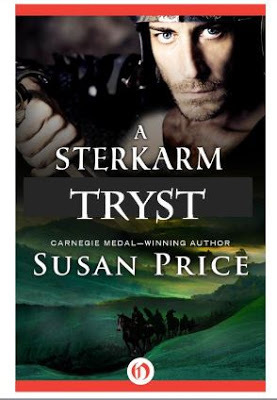 Tryst: (Old French) an appointed station in hunting. An appointed meeting place, often of lovers. To engage to meet a person or persons. A cattle market, e.g. 'The Falkirk Tryst.' A Sterkarm Tryst: an appointed meeting place of which only one side is aware: an ambush. Yesterday, January 24th, the third Sterkarm book,
A Sterkarm Tryst,
was published.
Tryst: (Old French) an appointed station in hunting. An appointed meeting place, often of lovers. To engage to meet a person or persons. A cattle market, e.g. 'The Falkirk Tryst.' A Sterkarm Tryst: an appointed meeting place of which only one side is aware: an ambush. Yesterday, January 24th, the third Sterkarm book,
A Sterkarm Tryst,
was published.It's the third in the series. The first two, after being out of print for some years, have been republished by Open Road. They are The Sterkarm Handshake and A Sterkarm Kiss.
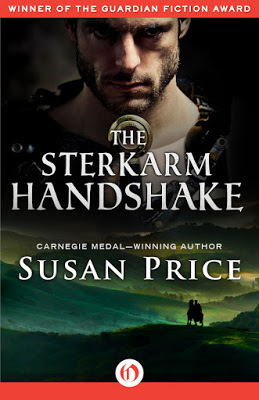 The Sterkarm Handshake by Susan Price
The Sterkarm Handshake by Susan Price
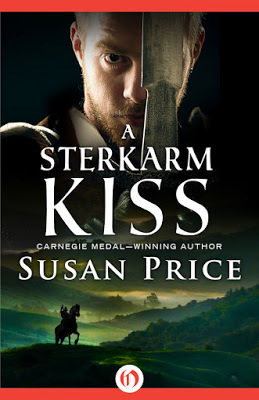 A Sterkarm Kiss by Susan Price
A Sterkarm Kiss by Susan PriceThe stories were inspired by the reivers of the Scottish Borders though Handshake only came to life for me when I thought of sending 21st Century urbanites through a time machine to the 16th Century Border Country, where the Sterkarms take them for Elves. Their strange clothes and hairstyles give them an eldritch appearance and their carts which move without horses demonstrate their supernatural powers.
The Sterkarms, the local Riding or Raiding* Family, welcome the Elves at first, for their magical wee white pills (aspirin). The welcome doesn't last. The Border men were notoriously 'ill to tame' and the Sterkarms don't relish being told what they can and cannot do, even by Elves.
* 'Raid' is from the Scandinavian or Scottish form of the Old English 'rade', which meant 'road.' Our word 'road' is from the same Old English word, which also gave us 'ridan' or 'ride'. A road was where you rode. A track over a moor or through a wood is still called 'a ride.'
Raiding was often what you were doing when you rode down a road or ride. So a 'Riding Family' and a 'Raiding Family' were the same thing. Ride, road and raid all stem from the same word.
And 'reivers', as in Scottish Border reivers, comes from the same root as 'bereave,' which survives to the present almost exclusively in the sense of bereavement by death. 'To reave' originally meant to rob, to take, to forcibly deprive.Looking back over the books, I realise that the words and music of old ballads run through all of them. (I hear the music, anyway.) The 21st-Century heroine, Andrea, is 'embedded' (in more ways than one) with the 16th-Century Sterkarms and learns many songs from them. She finds that the songs often give her the words to understand the Sterkarms and her own situation.
I just thought you might like to know that.
The higher on the wing it climbsThe sweeter sings the lark,And the sweeter that a young man speaksThe falser is his heart.He'll kiss thee and embrace theeUntil he has thee won,Then he'll turn him round and leave theeAll for some other one.
There's the ballad that gives the Sterkarms their rallying cry and boast:
My hob is swift-footed and sure,My sword hangs down at my knee, I never held back from a fight:Come who dares and meddle with me!
A 'hob' was the breed of small, strong, intelligent horse which the reivers rode (down roads on raids). This ballad was historically associated with the Elliot family rather than the Armstrong family on whom the Sterkarms are very, very loosely based. ('Sterkarm' means 'strong arm.)
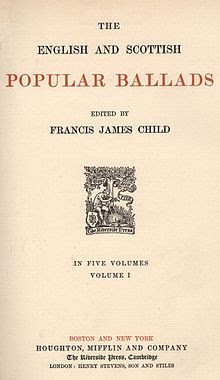 These old songs fitted themselves naturally into the story as I wrote. I'd known many of them by heart for decades before I had any idea of writing the Sterkarm books. I never had to hunt for a quote. The scene I was working on would set a particular song playing in my head.
These old songs fitted themselves naturally into the story as I wrote. I'd known many of them by heart for decades before I had any idea of writing the Sterkarm books. I never had to hunt for a quote. The scene I was working on would set a particular song playing in my head.I knew the songs because, while still a young teenager, my love of folklore led me to Child's Ballads. I was already familiar with the lyrics before I discovered recordings of them by various folk-groups.
I was a deep-dyed folkie, me. I was having none of your long-haired sensitive types strumming acoustic guitars while they intoned modern protest songs. If it wasn't at least 200 years old, I didn't want to hear it. I wanted elbow-pipes, Shetland fiddles and bodhrans. I wanted people with closed eyes singing unaccompanied with one hand over an ear. "As I walked out one midsummer morning..."
It was the stories, of course, that attracted me. I wanted to hear about the Billy Blind starting up at the bed's foot and the loathly worm toddling about the tree.
I often listen to music while writing and, for me, the music has to be fitted to the book I'm working on. It creates the atmosphere. For the Sterkarms, it had to be the Border Ballads. The music and words of the ballads are, for me, as much a part of setting the Sterkarm scene as details of their food, clothing, furniture and buildings.
I wasn't too purist, though. In A Sterkarm Handshake, Per Sterkarm is wandering through the alleys of the tower, on his way to Andrea's 'bower' or bedchamber. He thinks he's on a promise.
Oh, pleasant thoughts come to my mindAs I turn back smooth sheets so fine,And her two white breasts are standing soLike sweet pink roses that bloom in snow.
The second book, A Sterkarm Kiss ends with the lines:
For there's sweeter restOn a true-love's breastThan any other where.
Neither of these quotes come from the Border ballads, although folk-song is, by its very nature, hard to date. The first verse, as far as I know, comes from 'The Factory Maid.'
I'm a hand-loom weaver by my trade,But I'm in love with a factory-maid,And could I but her favour win,I'd break my looms and weave with steam.
This dates it, probably, to the 19th century and means it's
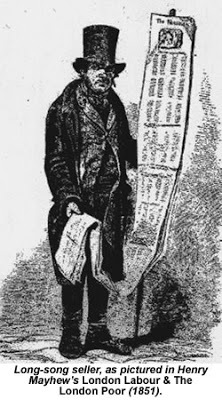 Mayhew's broadside ballad sellerlikely to be a 'broadside ballad.' These were printed lyrics, often written about hot topics of the day, such as industrialisation, and sold in market-places. There was no music but the name of some well-known tune would be given. 'To be sung to the tune of...'
Mayhew's broadside ballad sellerlikely to be a 'broadside ballad.' These were printed lyrics, often written about hot topics of the day, such as industrialisation, and sold in market-places. There was no music but the name of some well-known tune would be given. 'To be sung to the tune of...' The lines about the true-love's breast come from a song with a lovely tune, which I know as 'Searching for Lambs.' (This being what 'the loveliest maid that e'er I saw' was doing when her lover walked out one midsummer morning.) It's very hard to guess at a date for the lovely maid and her ewes, but the song doesn't have the robust mix of the supernatural and extreme vengeful violence that typifies the Border ballads, so it's probably later.
This doesn't mean that the Sterkarms wouldn't know these verses. I justify my inclusion of them by the way that elements of folk-tales and ballads 'migrate,' turning up again and again in different songs and stories.
They were spread by word of mouth. If a singer or story-teller couldn't remember a detail, they invented their own. Or inserted a verse they could remember from another song. They might also take a verse from one song and put it into another simply because they liked it. Some old songs almost seem to be compilations of verses:
Oh had I wist, when first I kissedThat Love had been so ill to win,I'd have shut my heart in a silver cageAnd pinned it with a silver pin.
When cockle-shells turn silver bellsWhen fishes swim from tree to treeWhen ice and snow turn fire to burnIt's then, my love, that I'll love thee.
The men of the forest, they asked it of me,How many sweet strawberries grow in the salt sea;I answered them well, with a tear in my e'e;'As many fish swim in the forest.'
The writers of broadside ballads certainly drew on these old songs too, re-using verses to save time as they tried to make a living. So because a verse was published in a broadsheet ballad about a factory maid doesn't mean that something very like it wouldn't have been known earlier.
And just because a gentle love song doesn't mention treachery, incest, fratricide, infanticide or any of the other -cides so popular in the Border ballads, it doesn't mean it wasn't known on the Borders. Even there, they had their quieter moments.
I thought it was a pity that my readers couldn't hear the songs that are quoted so frequently throughout the Sterkarm books - and then realised that there was a way for me to share them. If you have a Facebook or Spotify account, here's a link to my playlist for the Sterkarm books. If you like songs about murder, revenge killings and executions - and the occasional love-song - this is for you.
Published on January 21, 2017 16:00
No comments have been added yet.
Susan Price's Nennius Blog
"I have made a little heap of all I've found..."
"I have made a little heap of all I've found..."
...more
- Susan Price's profile
- 71 followers



